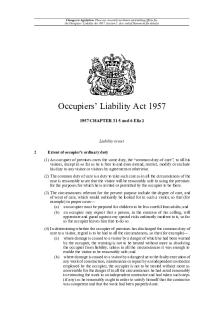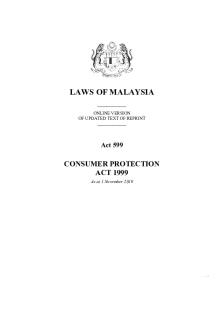Admissibility of Evidence obtained in contravention of the Data Protection Act, 2019 - Lexology PDF

| Title | Admissibility of Evidence obtained in contravention of the Data Protection Act, 2019 - Lexology |
|---|---|
| Course | evidence law |
| Institution | University of Nairobi |
| Pages | 2 |
| File Size | 87.6 KB |
| File Type | |
| Total Downloads | 130 |
| Total Views | 597 |
Summary
Your email address is not yet verified. To complete Your email address is not yet verified. To complete your registration and finish setting up your accountyour registration and finish setting up your account, please verify your email address. , please verify your email address. Send a new verificat...
Description
Your email address is not yet verified. To complete your registration and finish setting up your account, please verify your email address.Send a new verification email.
Admissibility of Evidence obtained in contravention of the Data Protection Act, 2019 Kenya February 21 2020 T he Dat a Prot ect ion Act , 2019 (t he “DPA” or t he “Act ”) which came int o force on 25 thNovember 2019 regulat es how and when personal dat a can be obt ained, handled or disposed. T he DPA was enact ed t o give effect t o Art icles 31(c) and (d) of t he Const it ut ion. T he t wo clauses guarant ee t he prot ect ion of t he privacy of personal informat ion and communicat ion. In t hat regard, t he DPA provides for principles of dat a prot ect ion, right s of a dat a subject , requirement s for collect ing personal dat a and rest rict ions on handling personal dat a. Collect ion of dat a under t he DPA is required t o be st rict ly by informed consent of t he dat a subject . T he subject also has a right t o be informed of t he use t o which t he dat a is t o be put . T he DPA limit s t he use of t he dat a t o t he purpose specified during t he collect ion. In addit ion, t he dat a subject must be informed whet her t he dat a collect ion is compulsory and any consequences of failing t o provide any of t he request ed dat a. Furt hermore, t he dat a subject has right s under t he DPA t o access, object , correct and delet e false or misleading dat a held by any person. T he DPA furt her requires t hat dat a must be collect ed direct ly from t he dat a subject . T he DPA is going t o impact on t he rules of admissibilit y of evidence cont aining personal dat a. Evidence relied on in disput e resolut ion whet her in lit igat ion or alt ernat ive disput e resolut ion cont aining personal dat a risks exclusion for failure t o comply wit h t he provisions of t he DPA. Tradit ionally, t he common law as applied by Kenyan Court s has always t reat ed unlawfully obt ained evidence as generally admissible as far as it is relevant t o t he proceedings before t he court . T herefore, evidence obt ained in cont ravent ion of t he DPA would have been t reat ed as admissible.
However, court rulings in t he recent past indicat e a depart ure from t he common law view on admissibilit y of illegally obt ained evidence. In t he case of Njonjo Mue & another v Chairperson of Independent Electoral and Boundaries Commission & 3 others [2017] eKLR, t he Supreme Court of Kenya depart ed from t he broad view on admissibilit y of illegally obt ained evidence. T he Supreme Court expunged evidence obt ained by t he pet it ioner in cont ravent ion of t he Access t o Informat ion Act , 2016. T he court reasoned t hat if a legislat ion has specified a part icular procedural or subst ant ive requirement for obt aining evidence t hen t hose requirement s must be st rict ly complied wit h. T he court also recognized t he const it ut ional imperat ive in Art icle 50(4) which requires exclusion of any evidence obt ained in a manner t hat violat es any right s or fundament al freedoms in t he Bill of right s T he evident iary implicat ions of t he DPA is t hat part ies wit h disput es before court and t ribunals will be required t o collect evidence in st rict compliance wit h t he DPA since court s are mandat ed t o follow t he binding precedent in t he above Supreme court ruling. It is wort h not ing t hat t here will be a t ough balancing act bet ween t he right s t he dat a subject s’ right t o privacy and t he necessit y of using personal dat a t o inst it ut e and defend claims in disput e resolut ion. CFL Advo cat e s - Billy Wesonga and Dennis Kuloba...
Similar Free PDFs

Improperly obtained evidence
- 3 Pages

Section 5 of Evidence Act
- 5 Pages

Data - Sales of goods act
- 3 Pages

The Express Protection of Rights
- 2 Pages

THE Effective RATE OF Protection
- 2 Pages

Law of Evidence in Kenya
- 36 Pages

Care & Protection of Children
- 3 Pages

Consumer Protection ACT Notes
- 5 Pages
Popular Institutions
- Tinajero National High School - Annex
- Politeknik Caltex Riau
- Yokohama City University
- SGT University
- University of Al-Qadisiyah
- Divine Word College of Vigan
- Techniek College Rotterdam
- Universidade de Santiago
- Universiti Teknologi MARA Cawangan Johor Kampus Pasir Gudang
- Poltekkes Kemenkes Yogyakarta
- Baguio City National High School
- Colegio san marcos
- preparatoria uno
- Centro de Bachillerato Tecnológico Industrial y de Servicios No. 107
- Dalian Maritime University
- Quang Trung Secondary School
- Colegio Tecnológico en Informática
- Corporación Regional de Educación Superior
- Grupo CEDVA
- Dar Al Uloom University
- Centro de Estudios Preuniversitarios de la Universidad Nacional de Ingeniería
- 上智大学
- Aakash International School, Nuna Majara
- San Felipe Neri Catholic School
- Kang Chiao International School - New Taipei City
- Misamis Occidental National High School
- Institución Educativa Escuela Normal Juan Ladrilleros
- Kolehiyo ng Pantukan
- Batanes State College
- Instituto Continental
- Sekolah Menengah Kejuruan Kesehatan Kaltara (Tarakan)
- Colegio de La Inmaculada Concepcion - Cebu







